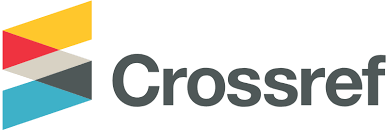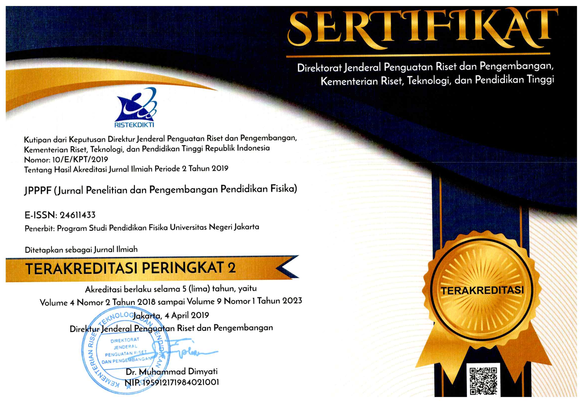Enhancing Students' Learning Outcomes and Science Process Skills through STEM Project-Based Learning on Global Warming Topics
Abstract
Global warming is a major concern, and tackling it via education is crucial. The purpose of this study is to investigate the impact of combining the Science, Technology, Engineering, and Mathematics (STEM) approach with the Project-based Learning (PjBL) model on students' learning outcomes and science process skills in global warming topics. The study, which used a one-group pretest-posttest design, collected data from 33 grade XI students via essay questions and observation sheets to assess learning outcomes and science process skills. Critical indicators of science process abilities were observing, classifying, interpreting, predicting, applying concepts, communicating, and forming conclusions. Students worked on a STEM-based project to build a flood-resistant house over the course of five meetings (including the pretest and post-test). The findings revealed considerable improvements: learning outcomes increased by 0.6 (medium category), while science process skills improved by 0.7 (high category). Observations revealed that pupils' scientific process skills were excellent. The Wilcoxon test revealed a significant difference between students' learning outcomes and science process abilities before and after the intervention, with a Sig (2-tailed) value of 0.000. The study indicated that combining the STEM method with the PjBL model improves students' learning outcomes and scientific process abilities. However, the small sample size implies that the results may not be generalizable. The consequence is that integrating the STEM method and the PjBL model provides an innovative option in physics education, improving learning outcomes and scientific process skills.
References
Asrizal, A., Mardian, V., Novitra, F. and Festiyed, F. (2022). Physics electronic teaching material-integrated STEM education to promote 21st-century skills. Cypriot Journal of Educational Sciences, 17(8), pp.2899–2914. doi:https://doi.org/10.18844/cjes.v17i8.7357.
Bhakti, Y.B., Astuti, I.A.D., Okyranida, I.Y., Asih, D.A.S., Marhento, G., Leonard, L. and Yusro, A.C. (2020). Integrated STEM Project Based Learning Implementation to Improve Student Science Process Skills. Journal of Physics: Conference Series, 1464(1), p.012016. doi:https://doi.org/10.1088/1742-6596/1464/1/012016.
Çakiroğlu, Ü., Güven, O. and Saylan, E. (2020). Flipping the experimentation process: influences on science process skills. Educational Technology Research and Development, 68(6), pp.3425–3448. doi:https://doi.org/10.1007/s11423-020-09830-0.
Contreras-Espinosa, R.S. and Eguia-Gomez, J.L. (2022). Game Jams as Valuable Tools for the Development of 21st-Century Skills. Sustainability, 14(4), p.2246. doi:https://doi.org/10.3390/su14042246.
Dwikoranto, D., Setiani, R., Madlazim, M. and Erman, E. (2018). Validity of Project Based Laboratory Learning: An Innovative Physics Laboratory Learning to prepare Sciences Process Skills and Creativity of Physics Teacher Candidate. International Conference on Science and Technology (ICST 2018) , pp.912–917. doi:https://doi.org/10.2991/icst-18.2018.184.
Emara, M., Hutchins, N., Grover, S., Snyder, C. and Biswas, G. (2021). Examining Student Regulation of Collaborative, Computational, Problem-Solving Processes in Open-Ended Learning Environments. Journal of Learning Analytics, 8(1), pp.49–74. doi:https://doi.org/10.18608/jla.2021.7230.
Erlinawati, C.E., Bektiarso, S. and Maryani, M. (2019). Model Pembelajaran Project Based Learning Berbasis STEM pada Pembelajaran Fisika. In: Fkip E-Proceeding. pp.1–4.
Farach, N., Kartimi, K. and Mulyani, A. (2021). Application of performance assessment in STEM-based biological learning to improve student’s science process skills. Journal of Physics: Conference Series, 1806(1), p.012220. doi:https://doi.org/10.1088/1742-6596/1806/1/012220.
Fraenkel, J.R., Wallen, N.E. and Hyun, H.H. (2018). How to design and evaluate research in education. New York Mcgraw-Hill Education.
Gupta, R., Voiklis, J., Rank, S.J., Dwyer, J. de la T., Fraser, J., Flinner, K. and Nock, K. (2020). Public perceptions of the STEM learning ecology – perspectives from a national sample in the US. International journal of science education. Part B. Communication and public engagement, 10(2), pp.112–126. doi:https://doi.org/10.1080/21548455.2020.1719291.
Hacıeminoğlu, E., Yıldız, N.G. and Şeker, R. (2022). Factors Related to Cognitive Reasoning of Pre-Service Teachers’ Science Process Skills: Role of Experiments at Home on Meaningful Learning. Sustainability, 14(13), p.7703. doi:https://doi.org/10.3390/su14137703.
Hake, R.R. and Reece, J. (1999). Analyzing Change/Gain Scores. doi:https://doi.org/doi.org/10.24036/ekj.v1.i1.a10.
Hiğde, E. and Aktamış, H. (2022). The effects of STEM activities on students’ STEM career interests, motivation, science process skills, science achievement and views. Thinking Skills and Creativity, 43, p.101000. doi:https://doi.org/10.1016/j.tsc.2022.101000.
Iserte, S., Tomás, V.R., Pérez, M., Castillo, M., Boronat, P. and García, L.A. (2023). Complete Integration of Team Project-Based Learning Into a Database Syllabus. IEEE transactions on education, 66(3), pp.218–225. doi:https://doi.org/10.1109/te.2022.3217309.
Kim, M. and Pegg, J. (2019). Case analysis of children’s reasoning in problem-solving process. International Journal of Science Education, 41(6), pp.739–758. doi:https://doi.org/10.1080/09500693.2019.1579391.
Lambert, C.E., Troister, T., Ramadan, Z., Montemarano, V., Fekken, G.C. and Holden, R.R. (2020). Psychache Predicts Suicide Attempter Status Change in Students Starting University. Suicide and Life-Threatening Behavior, 50(3). doi:https://doi.org/10.1111/sltb.12624.
Lawless, M.S. and Gosselin, K.R. (2023). Project-based learning goes wrong: the trials, tribulations, and triumphs of managing first-year and fourth-year engineering projects. The journal of the Acoustical Society of America, 153(3_supplement), pp.A273–A273. doi:https://doi.org/10.1121/10.0018822.
Miller, E.C., Reigh, E., Berland, L. and Krajcik, J. (2021). Supporting Equity in Virtual Science Instruction Through Project-Based Learning: Opportunities and Challenges in the Era of COVID-19. Journal of Science Teacher Education, 32(6), pp.1–22. doi:https://doi.org/10.1080/1046560x.2021.1873549.
Mukaromah, S.H. and Wusqo, I.U. (2020). The influence of PjBL model with stem approach on global warming topic to students’ creative thinking and communication skills. Journal of Physics: Conference Series, 1521(4), p.042052. doi:https://doi.org/10.1088/1742-6596/1521/4/042052.
Oyewo, O.A., Ramaila, S. and Mavuru, L. (2022). Harnessing Project-Based Learning to Enhance STEM Students’ Critical Thinking Skills Using Water Treatment Activity. Education Sciences, 12(11), p.780. doi:https://doi.org/10.3390/educsci12110780.
Padmadewi, N.N., Artini, L.P., Ratminingsih, N.M., Suhardiana, A., Zamzam, A. and Adi, P. (2023). Designing Project-Based Learning in research proposal writing: Its effect, problems, and scaffolding utilized. Studies in English Language and Education, 10(2), pp.841–862. doi:https://doi.org/10.24815/siele.v10i2.27408.
Pradita, A.P., Budiharti, R. and Budiawanti, S. (2020). Analisis Kebutuhan Pengembangan Perangkat Pembelajaran Fisika Berbasis Proyek Materi Gejala Pemanasan Global. Jurnal Materi dan Pembelajaran Fisika, 10(1), p.20. doi:https://doi.org/10.20961/jmpf.v10i1.41583.
Prajoko, S., Sukmawati, I., Maris, A.F. and Wulanjani, A.N. (2023). Project Based Learning (PjBL) Model with STEM Approach on Students’ Conceptual Understanding and Creativity. Jurnal Pendidikan IPA Indonesia, 12(3), pp.401–409. doi:https://doi.org/10.15294/jpii.v12i3.42973.
Purwaningsih, E., Sari, S.P., Sari, A.M. and Suryadi, A. (2020). The Effect of STEM-PjBL and Discovery Learning on Improving Students’ Problem-Solving Skills of Impulse and Momentum Topic. Jurnal Pendidikan IPA Indonesia, 9(4), pp.465–476. doi:https://doi.org/10.15294/jpii.v9i4.26432.
Schneider, B., Krajcik, J., Lavonen, J., Salmela-Aro, K., Klager, C., Bradford, L., Chen, I-Chien., Baker, Q., Touitou, I., Peek-Brown, D., Dezendorf, R.M., Maestrales, S. and Bartz, K. (2022). Improving Science Achievement—Is It Possible? Evaluating the Efficacy of a High School Chemistry and Physics Project-Based Learning Intervention. Educational Researcher, 51(2), pp.109–121. doi:https://doi.org/10.3102/0013189x211067742.
Solé-Llussà, A., Aguilar, D. and Ibáñez, M. (2020). Video-worked examples to support the development of elementary students’ science process skills: a case study in an inquiry activity on electrical circuits. Research in Science & Technological Education, 40(2), pp.1–21. doi:https://doi.org/10.1080/02635143.2020.1786361.
Soltani, A. (2020). Influence of Motivating Science Class, Family, and Peer Models on Students’ Approaches to Learning Science: A Structural Equation Modeling Analysis. Research in Science Education, 50(5). doi:https://doi.org/10.1007/s11165-018-9748-1.
Sulaeman, N., Efwinda, S. and Putra, P.D.A. (2022). Teacher readiness in STEM education: Voices of Indonesian Physics teachers. Journal of Technology and Science Education, 12(1), p.68. doi:https://doi.org/10.3926/jotse.1191.
Vennix, J., den Brok, P. and Taconis, R. (2018). Do outreach activities in secondary STEM education motivate students and improve their attitudes towards STEM? International Journal of Science Education, 40(11), pp.1263–1283. doi:https://doi.org/10.1080/09500693.2018.1473659.
Wangguway, Y., Kurniawati, S., Maylisa, I.N., Jabbar, A. and Sulistiyono, B. (2020). The analysis of STEM-PjBL implementation and its effect on students’ metacognition skills in resolving social arithmetic problems. Journal of physics. Conference series, 1563(1), pp.012048–012048. doi:https://doi.org/10.1088/1742-6596/1563/1/012048.
Weng, X., Ng, O.-L., Cui, Z. and Leung, S. (2022). Creativity Development With Problem-Based Digital Making and Block-Based Programming for Science, Technology, Engineering, Arts, and Mathematics Learning in Middle School Contexts. Journal of Educational Computing Research, 61(2), p.073563312211156. doi:https://doi.org/10.1177/07356331221115661.
Widarti, H.R., Rokhim, D.A. and Syafruddin, A.B. (2020). The Development of Electrolysis Cell Teaching Material based on STEM-PjBL Approach Assisted by Learning Video: A Need Analysis. DOAJ (DOAJ: Directory of Open Access Journals), 9(3).
Yunita, D., Nurhadi, M. and Kusumawardani, R. (2018). Analisis keterampilan proses sains dan hasil belajar siswa kelas X dengan menggunakan model pembelajaran PBL (problem based learning) pada pokok bahasan larutan elektrolit dan nonelektrolit. Bivalen: Chemical Studies Journal, 1(2), pp.96–100. doi:https://doi.org/10.30872/bcsj.v1i2.290.
Copyright (c) 2024 Mona Lisa Hafitri, Shelly Efwinda

This work is licensed under a Creative Commons Attribution 4.0 International License.











